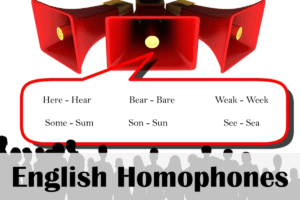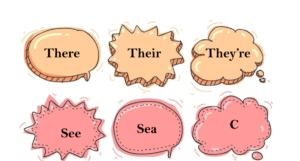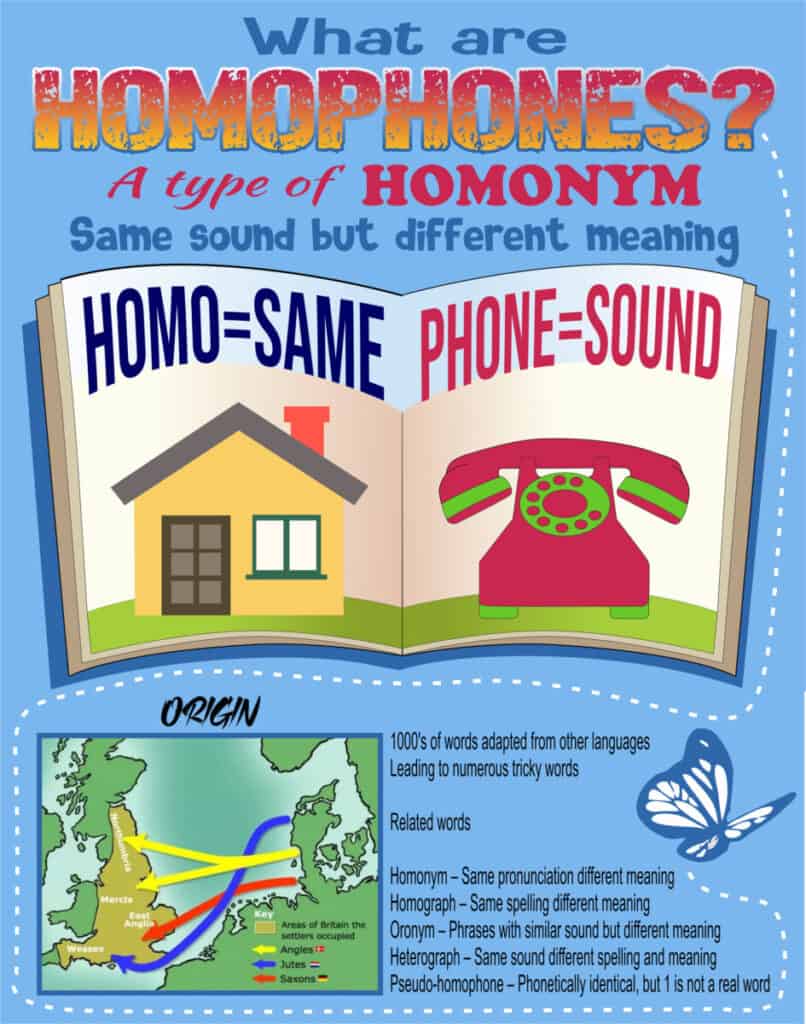Baffled by pairs of words that have the same sound but different spellings and meanings? You’re likely dealing with homophones. This comprehensive guide to homophones definition and examples will help you distinguish between these tricky words that sound alike, enabling you to communicate more effectively and avoid common spelling errors.
Have you ever been embarrassed in your social media post or content because you’ve used the wrong word – a word that sounds the same but has a different meaning? Like when you accidentally tweeted “I need a brake” when what you actually meant was the you need a break? Well, welcome to the world of homophones! Don’t worry, it’s not just you who gets confused when it comes to these words.
If you’re in the process of learning the English language, then you must read this article! Whether you’re a language learner or just want to improve your writing and communication skills, this guide to homophones definition and examples First, we will help you understand what homophones are, and then we will learn to recognize common mistakes people make.
Homophones Definition and Examples: Understanding Words that Sound the Same
We are going to discuss “what are homophones” in the easiest way possible. We’ll also give you examples to completely clear up your confusion. Learning the English language should be interesting, and this post will make it even more enjoyable for you!
Homophones are a type of homonym: words that sound the same or are spelled the same but do not have the same meaning. These words can occur in groups of two, three or four, but most commonly in groups of two. It is essential to be familiar with these words as well as their respective meanings, as one mistake can completely change the meaning of a sentence.
English, an international language, has thousands of words that are adapted from different languages worldwide. Also, it has many different dialects and accents. This means that, across its history, English has built up an abundance of tricky words.
What does “homophone” mean?
Homophone comes from Greek. In Greek, the word Homo means “the same”, and the Greek word phone means “sound.” So, Homophone means “same sound.” This means that a homophone is 2 words with different meanings that are pronounced the same.
So, let’s answer what are homophones with examples. Here are some common English homophones:
Hear – Here
Sum – Some
Bear – Bare
Sea – See
Week – Weak
Can homophones Be Spelled the Same?
Can you use all of these homophones correctly?
To answer this clearly, let’s discuss the different types of words related to homophones:
- Homophone – Words that are pronounced the same but have different meanings are called homophones. Examples are site, cite, and sight/flu,flew/week, weak.
- Homograph – These are words with the same spelling but different meanings. Let’s say, for instance, the term “bat.” It could both refer to the animal, or a baseball bat.
- Oronym – Phrases or a group of words with a similar sound but different meanings are called oronyms. I scream and ice cream, for instance.
- Heterograph – These are words with different spellings and different meanings that share the same sound. For example, I and eye/hear and here.
- Pseudo-homophone – These words are phonetically identical. However, one word in the pair is usually not a real word. Let’s take groan and grone as examples.
- Homonym – a word that is spelled and pronounced the same, but has two different meanings e.g. lie
Generally, these are all kinds of homonym! However, a homophone that is spelled the same is either a homonym or a homograph.
Common Examples of Homophones
Did you know that there are 7700 homophones in the English vocabulary? Do you want to challenge yourself? Here are a few questions to warm up your brain cells. We’ll provide the answers, but kindly take some time to think before scrolling below!
- What is the homophone of break?
- And what is the homophone of loan?
- How about the homophone of course?
Firstly, the correct answer for number 1 is brake – as in a car brake. These are homophones because they have the same sound but different meanings.
Secondly, for number 2 the answer is “lone.” Loan refers to a thing, usually money that is borrowed and usually entails interest during payback time. Lone, on the other hand, means single, isolated, or lacking companions.
Finally, for question 3, the homophone of course is coarse. A course is something you participate in – a university course, an English course – and coarse means “a rough, harsh texture.”
Below are more commonly-used homophones in the English language. To help you understand their meanings better, check out the sample sentences below.
- air, heir
- be, bee
- bare, bear
- cent, scent
- dear, deer
- hear, here
- cell, sell
- knight, night
- hour, our
- brake, break
- male, mail
- suite, sweet
- piece, peace
- tail, tale
- steal, steel
- stair, stare
- shore, sure
- poor, pour
- way, weigh
- pray, prey
- son, sun
Let’s try to use these homophones in a sentence.
Examples:
- I won the contest with a prize of one thousand dollars.
- My son’s eyes hurt because he stared at the sun for too long.
- How can the train fare be so expensive? That’s not fair!
- I made these cookies for you, I didn’t ask our maid to bake them.
- Let’s meet at around 8 o’clock, then we’ll buy meat for lunch.
- My mother asked where I was going and helped me pick what to wear because she is good at fashion.
- I feel fat because I ate eight pieces of marshmallows.
- I’m sure we’ll spend some time at the shore, because it’s going to be very sunny.
- Last week I felt weak all week, but I feel better now.
Can you find the homophones in each sentence?
- The king’s heir enjoys the fresh air on top of the mountains.
- My mother said I should be outside in the fresh air but I saw a bee and am scared.
- The forest was bare so we couldn’t hide from the angry bear.
- I bought the 50-cent cologne that was on sale because it has a long-lasting scent.
- Did you hear that the guests are already here?
- My dear father loves to go deer-hunting with his friends once a month.
- Jose, a prison guard, sells cupcakes to inmates. He delivers it to their respective cells every afternoon.
- The brave knight kicked his massive horse because he was angry, and disappeared into the night.
- Because we only had a little time, our physics professor reminded us to finish the experiment in an hour.
- I have to take my bicycle to the shop. I’m afraid the brake pedal would completely break anytime.
But wait… are homophones the same in all varieties of English?
Now that you learned about Homophones Definition and Examples, the next question is “Are homophones the same in all varieties of English?”
When you read the list above, did you agree with them all? Or were there some you don’t think are homophones? For example, hour and our? Do you pronounce these words the same?
Well, you may have just realized that different accents and different dialects of English have different homophones! Because English speakers around the world say words differently, homophones are also different around the world. But don’t worry – this doesn’t mean one accent is “right” and the others are “wrong.” People all over the globe use English, and it is natural that you will encounter homophones in many different settings!
Now, are you ready to challenge yourself and create sentences using the homophones from above? First, you should try to make sentences on your own. Then, once you’re done, we can talk more about homophones through this guide on Homophones Definition and Examples!
How to Remove Your Confusion When It Comes to Homophones
Let’s say you are a writer who confuses homophones. Misused homophones can easily ruin your composition as you might deliver a different context to your readers. In addition, if you are a professional worker who is exposed to communicating with business letters and e-mails, you may want to check your sentences before clicking ‘Send’ to avoid conflict on the side of the receiver. If you’re having trouble distinguishing these tricky words, then perhaps the tips below can help.
-
Visualization
Picturing the difference between a pair of homophones is an excellent technique to erase your confusion. Take the words that often confuse you and visualize two distinct pictures in your mind. Let’s say, for instance, the homophones heel and heal.
Visualize the word heel. Get a shoe, look at the heel, and notice its shape and color. Observe if there are cracks or if the material is smooth. Take a few seconds to hold the image in your mind before you let it go. Then, picture the word heal. Visualize how a doctor performs surgery. Imagine the emotion that the doctor feels when the operation turned out to be successful.
When you let your mind draw imagery in conjunction with the pair of homophones, you are creating a space for those words in your memory. Firstly, get a pen and paper and draw the images you see for each homophone. Secondly, label each image with the correct homophone. Finally, review these images every few days.
-
Mnemonic Devices
Do you often get confused when it comes to using there and they’re? How about your and you’re? Well, most people fall into confusion because they are abstract words, meaning they are hard to visualize. For this type of homophones, experts recommend the use of mnemonic devices to help you distinguish the difference. These devices are tools that help you remember ideas or phrases with letters, numbers, or relatable associations.
Here are some tips to avoid confusion with using there/their and they’re:
There – refers to a position or a place.
Example: We’ll cross the bridge when we get there.
Their – refers to ownership. It is also a pronoun alongside him, her, and them.
Example: Their family is known for having many riches.
They’re – This is fairly easy to remember since this is the shortcut for “they are”.
Example: They’re the ones who stole your money, aren’t they?
Meanwhile, here are some uses of your and you’re:
Your – refers to ownership.
Example: Your bag looks expensive.
You’re – This is the shortcut for “you are”.
Example: You’re so funny, I want you to be my friend.
-
Let’s use loose and lose as examples.
The word loose means something is not securely attached. Therefore, to remember it you should notice the two o’s. Well, these two o’s would be easy to remember when you look at the holes of your belt. A belt is a thing that we usually use to secure loose pants in place, so we need at least two holes! Next, let’s go to the word lost which has a single o. Where’s the other o? Why not imagine that you lost it on a bet on Las Vegas!
-
Use Your Word Processor’s Find Function
If you can’t help but mix homophones now and then, this tip might be a valuable one. Once you’re done writing, take advantage of your word processor’s find function. Let’s say you are guilty of misusing the word to and too. Before submitting or publishing your content, find the word “to” in your file, and double-check if you have used it appropriately. Do the same with the homophone.
-
Check context.
If you know what part of speech the given word is, then you lessen the possibility of misusing it. So, is the word a verb, a noun, and adjective, or is it something else? Firstly, you should always identify the word form. According to English experts, context is key. Identify the words that often cause trouble for you, and learn their definition, part of speech, and context.
Let’s use meat and meet as examples. Meat is a noun while meet is a verb or an action word. When you accidentally wrote the sentence, “Mother will cook meet tonight,” you’ll easily spot the mistake. Why? It’s because you know that meet is an action word and it is impossible to cook it.
Most people think that homophones are additional burdens to their journey of learning the English language. However, with the right tips, these words can be pretty cool. So, we hope this article about homophones can make learning more fun and more exciting for you!
A big list of homophones!
Check out the table below for a long list of common English homophones. Do you know all their meanings?
| Homophone 1 | 2 | 3 |
| Allowed | Aloud | |
| Alter | Altar | |
| Add | Ad | |
| aisle | I’ll | Isle |
| Ate | Eight | |
| Bare | Bear | |
| By | Bye | Buy |
| Knight | Night | |
| Been | Bean | |
| Be | Bee | |
| Band | Banned | |
| Blue | Blew | |
| Bored | Board | |
| Cereal | Serial | |
| Cord | Chord | Cored |
| Chilli | Chile | Chilly |
| Eye | I | Aye |
| Farther | Father | |
| Find | Fined | |
| Flower | Flour | |
| Knows | Noes | Nose |
| Lesson | Lessen | |
| Seller | Cellar | |
| See | Sea | |
| Scent | Cent | Sent |
| Deer | Dear | |
| Here | Hear | |
| Brake | Break | |
| Male | ||
| Poor | Pour | |
| Pare | Pair | Pear |
| Pray | Prey | |
| rain | reign | rein |
| Sweet | Suite | |
| Steel | Steal | |
| Stare | Stair | |
| Some | Sum | |
| Son | Sun | |
| Stationary | Stationery | |
| Sought | Sort | |
| Scene | Seen | |
| Road | Rode | |
| Source | Sauce | |
| Tale | Tail | |
| Their | There | They’re |
| to | too | two |
| Weigh | Way |
Homophones Definition and Examples: Key Takeaways
To sum it up, homophones can be a source of confusion for many people, especially those learning the English language. However, with the help of this comprehensive guide on Homophones definition and examples, you should now have a better understanding of what they are and how to use them correctly. By recognizing common homophones and practicing their usage in context, you can avoid common mistakes and communicate more effectively in both written and spoken English. So the next time you come across a pair of words that sound the same but have different meanings and spellings, you’ll know just what to do!





